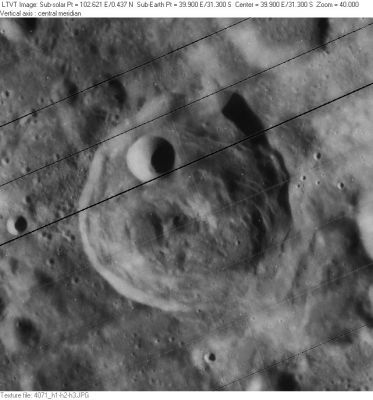Difference between revisions of "Neander"
| Line 6: | Line 6: | ||
|} | |} | ||
<div id="toc"> | <div id="toc"> | ||
| − | [http://www.lpod.org/coppermine/albums/userpics/Neander_LO-IV-071_LTVT.JPG [[Image: | + | [http://www.lpod.org/coppermine/albums/userpics/Neander_LO-IV-071_LTVT.JPG [[Image:Normal_Neander_LO-IV-071_LTVT.JPG|external image normal_Neander_LO-IV-071_LTVT.JPG]]]<br /> ''[http://lpod.org/coppermine/displayimage.php?pos=-2628 LO-IV-071H]'' The 11-km crater on the northern floor of '''Neander''' is '''Neander A'''. 25-km '''Neander E''' is partially visible along the upper right margin.<br /> <br /> |
==Images== | ==Images== | ||
[http://www.lpod.org/coppermine/thumbnails.php?album=search&type=full&search=Neander LPOD Photo Gallery] [http://www.lpi.usra.edu/resources/lunar_orbiter/bin/srch_nam.shtml?Neander%7C0 Lunar Orbiter Images] [http://www.lpi.usra.edu/resources/apollo/search/feature/?feature=Neander Apollo Images]<br /> <br /> | [http://www.lpod.org/coppermine/thumbnails.php?album=search&type=full&search=Neander LPOD Photo Gallery] [http://www.lpi.usra.edu/resources/lunar_orbiter/bin/srch_nam.shtml?Neander%7C0 Lunar Orbiter Images] [http://www.lpi.usra.edu/resources/apollo/search/feature/?feature=Neander Apollo Images]<br /> <br /> | ||
| Line 14: | Line 14: | ||
<br /> | <br /> | ||
==Description: Elger== | ==Description: Elger== | ||
| − | ''([http://the-moon.us/wiki/IAU% | + | ''([http://the-moon.us/wiki/IAU%20directions IAU Directions])'' NEANDER.--This ring-plain, 34 miles in diameter, a short distance E.S.E. of [http://the-moon.us/wiki/Piccolomini Piccolomini], has a somewhat deformed rampart, which, however, except on the N., where there is a narrow gap occupied by a small crater, is continuous. It rises on the W. nearly 8,000 feet above the floor, on which there is a central mountain about 2,500 feet high. Schmidt shows some minor hills, a large crater on the N.W. side, and three smaller craters in the interior.<br /> <br /> |
==Description: Wikipedia== | ==Description: Wikipedia== | ||
[http://en.wikipedia.org/wiki/Neander_(crater) Neander]<br /> <br /> | [http://en.wikipedia.org/wiki/Neander_(crater) Neander]<br /> <br /> | ||
==Additional Information== | ==Additional Information== | ||
| − | Depth data from [http://the-moon.us/wiki/Kurt%20Fisher% | + | Depth data from [http://the-moon.us/wiki/Kurt%20Fisher%20Crater%20Depths Kurt Fisher database]<br /> |
* Westfall, 2000: 3.4 km | * Westfall, 2000: 3.4 km | ||
* Viscardy, 1985: 3.4 km | * Viscardy, 1985: 3.4 km | ||
Latest revision as of 02:07, 16 April 2018
Contents
Neander
|
Lat: 31.3°S, Long: 39.9°E, Diam: 50 km, Depth: 3.4 km, Rükl: 68 |
LO-IV-071H The 11-km crater on the northern floor of Neander is Neander A. 25-km Neander E is partially visible along the upper right margin.
Images
LPOD Photo Gallery Lunar Orbiter Images Apollo Images
Maps
(LAC zone 97D3) LAC map Geologic map
Description
Description: Elger
(IAU Directions) NEANDER.--This ring-plain, 34 miles in diameter, a short distance E.S.E. of Piccolomini, has a somewhat deformed rampart, which, however, except on the N., where there is a narrow gap occupied by a small crater, is continuous. It rises on the W. nearly 8,000 feet above the floor, on which there is a central mountain about 2,500 feet high. Schmidt shows some minor hills, a large crater on the N.W. side, and three smaller craters in the interior.
Description: Wikipedia
Additional Information
Depth data from Kurt Fisher database
- Westfall, 2000: 3.4 km
- Viscardy, 1985: 3.4 km
- Cherrington, 1969: 3.01 km
- Satellite crater Neander N is on the ALPO list of bright ray craters.
- Curious fault to the east-southeast of Neander (at 33° South/ 44° East). This fault was photographed by Howard Eskildsen during local pre-sunset illumination (evening terminator circumstances), see LPOD April 5 2013.
Nomenclature
Neumann, Michael; German mathematician (1529-1581).
- According to Whitaker (p. 213) this is identical to the name introduced by Riccioli, and has continued unchanged.
Neander Fault
- The Neander Fault is an unofficial name for the curious fault at 33° South/ 44° East (to the east-southeast of Neander). This unofficial name is included on chart 6 (page 25) in the 21st Century Atlas of the Moon (C.A.Wood/ M.J.S.Collins).
LPOD Articles
A Third Gander at Neander
Don't give me any of your lip (sunset at the Neander Fault).
Bibliography
A Portfolio of Lunar Drawings (Harold Hill), page 238 (the Neander-Reichenbach-Rheita region at sunset).
